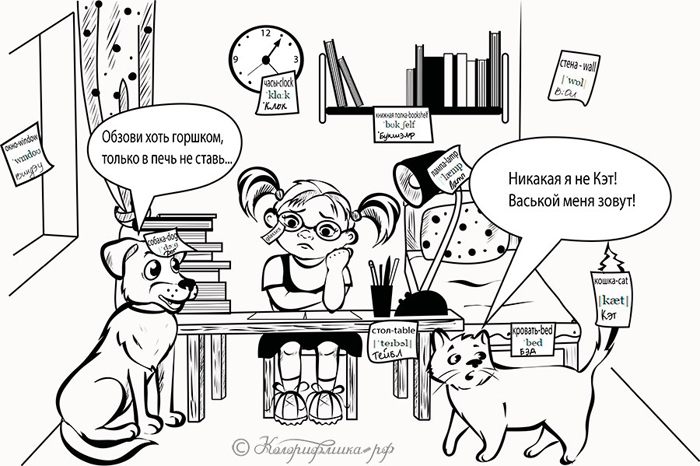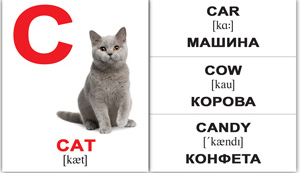ДОСТУП ОТКРЫТ
 |
Switch to Russian |
- Speaking of pronunciation, you never mentioned transcription. Aren't these concepts closely related? And isn't transcription fundamental to language learning and correct pronunciation?
God forbid! Such terrifying words as "transcription", in the same line with words like "discrimination", "inflation", and "devaluation", children shouldn't hear at all! By the way, I can say that my students, who started learning English from scratch (at about six years old), by their fifth year of study, being fluent speakers and readers (having read dozens of books up to the advanced level) would now ask, "What is transcription?". Thank God we managed without it!

Transcription in language learning is an example of the most typical atavism, just like the tail in primitive humans. It has long since fallen off, but many attach it either out of habit or in homage to an "old-fashioned" trend. Once upon a time, people couldn't do without a tinder, candle, or kerosene lamp, but now they use electricity. Although for coziness, one can sometimes light candles - they create a special atmosphere and decorate holidays, which cannot be said about transcription, which greatly hinders language acquisition and causes irreparable harm. Yes, not so long ago, within our memory, it was essential due to the lack of tape recorders.
The sources of sounds for us were teachers who sometimes played a game of "broken telephone" because they themselves learned from Russian-speaking instructors. Remember how, in our pioneer childhood, we were told about the extraordinary linguistic abilities of V.I. Lenin? About how, in particular, he learned English in 3 months? Later we read in N.K. Krupskaya's memoirs: "When Vladimir Ilyich and I arrived in London, no one understood us, and we didn't understand anyone! We had to hire a teacher and start all over again!". Let's not diminish Ilyich's linguistic abilities, he simply studied the language "dryly" for lack of better. He studied transcription in the same way as today's students, comparing the sound [ɑː] with the sound "a" in the word "stick", and referring to the sound [θ] as the interdental "s".

Perhaps our revolutionary leader couldn't even imagine such a wonderful device that could speak English by itself, with just the push of a button! This is more interesting than self-laying tablecloths or flying carpets! Maybe he even dreamt of something like that, which is why he included the "electrification of the entire country" in his definition of communism! Forget about Lenin! Those who are now 40-50 clearly remember the appearance of the first reel-to-reel tape recorders (a pricey rarity!). How we envied the privileged – the "Kremlin" children, who could listen to live English speech! We had to make do with gramophone records accompanying textbooks by Russian authors: "Repeat after the announcer: 'A-a'!" Then, as a breath of fresh air, as a revolutionary breakthrough, came the record set by Tamara Ignatova, which speculators bought and resold to us. And later, when perestroika broke the "Iron Curtain," a flood of linguaphone courses from Britain poured in.
Today, the variety of these courses is so vast that anyone can master a language without getting off the couch, as the cost of basic tape recorders and players is so low that they've become accessible to almost everyone! But we use these blessings of civilization like the heroine of I. Krylov with glasses: "sometimes she'll press them to her forehead, sometimes thread them on her tail!"
I often tell my students: "Remember this: to learn English without listening – is to learn how to swim…" and the children chorus: "…without water”! We've already talked a lot about listening, and it's clear that the principle of the communicative method: "The auditory image precedes the graphical one" - completely excludes transcription, making it unnecessary! But the thing is, it's not just unnecessary, it's dangerous!
- What is its danger?
There are two main reasons:
1. Killing the word.
2. Double graphic image (which does not facilitate understanding, but leads to confusion).
Let's discuss each. Auxiliary, modal verbs, and prepositions officially have "strong," "weak," and "semi-strong" forms. The verb "can," for example, has 4 transcriptions: [kæn], [kən], [kn], [kant] (negative form), but who said that other words have only one transcription? Doesn't the pronunciation of a word change depending on whether it's stressed or not, whether it's on a descending or ascending intonation, depending on the meaning and emotional tone the speaker gives it?

Indeed, it changes, sometimes to the point of being unrecognizable, or in the language of physics, to the point of being "undetectable" (the sound signals are completely different).
Which verb do we most often use with the word "word"?
Words flew off the lips.
A word is not a sparrow; once it flies away, you can't catch it.
This verb "to fly" likens a word to a bird. So, let's treat it accordingly, as something alive, not trying to grab it by the tail, pin it to the wall with the nail of a definitive translation, and dissect it with the scalpel of transcription. This is the kind of associations square brackets with signs of frogs, dollars, and little houses inside (æ, ∫, ^) evoke for me, like sharp scalpel incisions and the innards of a bird. So, it's better to watch the bird with a camera in hand, cautiously, so as not to scare it away, studying its habits, rather than attacking it with a scalpel.
- Does this mean that transcription is not needed?
No, of course not. Otherwise, the English themselves might sometimes not distinguish Manchester from Liverpool. But! What's permitted to Jupiter is not permitted to the bull! Only a surgeon, a person of the highest qualification whom God Himself has entrusted with other people's lives, has the right to take a scalpel in hand. But to give this tool to children... means to provoke them to kill. (In our case, we can consider linguists as surgeons, who can argue among themselves, inventing new types of transcriptions.)
I apologize for the abundance of sadistic analogies, but how else can I convey the feeling of a "living" language?! How to explain that uttering phrases in a robotic manner is infinitely far from the language?! Let's take a simple example to see how the killing of a word occurs.
A child learned the word "cat" along with its transcription [kæt], conscientiously dropping his chin to his chest in the process. Then, trying to pronounce the phrase “Is your cat black?”, he kills the phrase because [kæt] doesn't fit into it, unlike in the phrase “Is this your cat?”, where it fits very comfortably.

In this case, the word "cat" is analogous to the word "can" and could also claim to have 4 transcriptions. This applies even more to all other multisyllabic words because long words also manage to vary their intonations within themselves.
We unequivocally come to the conclusion:
If a child memorizes individual words by learning their transcription, he condemns himself to robotic speech!
|
Ch. 8. How to Resist the Temptation to Translate into Your Native Language? |
|
ДОСТУП ОТКРЫТ